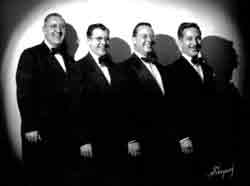


Five quartets allotted for 1948 International
 Antlers
|
The international preliminary was held on May 2, 1948. Because of our large membership we were entitled to five quartets at the international contest and 22 quartets competed for these places. The five chosen were the AETNA-AIRES of Bay City, the ANTLERS of Flint, the FOUR COUNTS of Oakland County, the GARDENAIRES and the LEFT OUT FOUR of Marcellus. The first alternate was the CLEF DWELLERS and the second alternate the PROGRESSIVES. The AETNA-AIRES were not able to go to Oklahoma City, and the CLEF DWELLERS took their place and became the only alternate quartet in history to wind up a medalist third-place winner at the international. The CLEF DWELLERS, up to this time, were only the third district quartet to win a medal. The ANTLERS and the GARDENAIRES were finalists at Oklahoma City.
 Cecil Fisher
|
The district was now holding two meetings a year. Grand Rapids, hoping to lure a large slice of the 2800 members of the district, extended every effort to make the annual district contest on December 18 the most attractive. Cecil H. Fisher, president of the Grand Rapids Chapter, pointed out that the Grand Rapids Chapter intended to provide every entertainment possible to make the visit and contest the most enjoyable. The Michigan District at its May meeting had voted to change the date of its conclave from February to December, and the Grand Rapids Chapter extended the first invitation.
The district contest was held in Grand Rapids in December, and the new state champs were the CLEF DWELLERS from Oakland County (Dick Wiseheart, tenor; Duncan Hannah, lead; Bill Johnston, baritone, and Hal Bauer, bass). In second place was the SONGMASTERS from Lansing (Hawkins, Bottom, Winegardner, McAttee), and in third place the COLLEGIANS of Grosse Pointe (Limburg, Burrell, Avram, Winship). Fourth place went to the BARONS of Wayne (Arthur, LeBaron, Truesdell, Ed Smith) and fifth place was taken by the NOTE-ORIOLES of Muskegon. This was the first contest in which awards were made to the junior and novice quartet champs. The junior champs were the HARMONIACS of Holland and the winner of the Novice Award was THE MEN OF ACHORD of Saginaw. The evening's entertainment included the Grand Rapids Chapter Chorus which was under the direction of Frank B. Goodwin.
District "Area Governors" introduced
 C. W. Coye |
 L. Wilson |
As mentioned earlier, 1948 was the year that district areas were established; and the first area counselors, then called "governors", were Cliff Davis of Ann Arbor, Rush Wyman of Lansing, Harold Gibbs of Bay City, Loton Willson of Boyne City, Steadman Rohn of Ludington, C. W. Coye of Grand Rapids, D. L. Barnhart of Kalamazoo and Mark Roberts of Grosse Pointe.
Disquieting developments
Mark Roberts, in his Michigan District and Its Men of Harmony made the following comments concerning the membership trends during the late forties. We have felt much of it has significance in today's barbershopping world.
 Mark Roberts
|
"The district reached its peak in number of chapters and members in 1947. In 1948 there was a sufficient loss of members to indicate that our singing brotherhood was not destined to go on forever showing a favorable balance of member-gains over losses. Just as we had shown a steady membership gain for several years, we now commenced a decline. The shattering of our barbershopper's euphoria, to which we had become accustomed, was rather shocking. For a few years, at least, it seemed that chapter success and membership gains came automatically with the receipt of a charter, and charters could be had for the asking. There was a multitude of joiners, attracted to the fun organization with the funny name; and, for a couple of years, the boys at Tulsa were really swamped with requests for information on how to join, organize a chapter, etc. It seemed that everyone wanted to get in on the fun, although some of the early enthusiasts had only a vague idea of what a barbershop quartet might be and no idea whatever of the distinguishing characteristics of barbershop harmony. It cost practically nothing to join in those days (the writer paid two bucks and swore he was being robbed) and, if nothing else, Society membership provided a status symbol for the musically uncultured."
"While this whimsical attitude toward the Society by both its members and outsiders was one of its early attractions, it also produced a state of extreme confusion because no one had any idea where we were going or, at any given time, where we were. The confusion ended with the appearance of administrators, such as Carroll Adams, who couldn't abide the happy chaos which prevailed. With the end of confusion came controls, disciplines, rules and regulations and, of course, the collection of dues."
"All this business-like approach meant that the organization was now taking itself somewhat seriously, and we began to talk of improving our singing and instituting programs designed to make the barbershopper more proficient in the art. We even went as far as making barbershop singing more palatable to the world of orthodox music. Surely there was and is no reasonable basis to oppose the improvement of our music or to oppose a business-like administration of Society affairs; but, just as surely, Society membership lost its attraction for uncounted thousands of American males who, as singers, like their barbershop renditions straight, uncomplicated, unpracticed and casual. They are of the cult of fun, song and fellowship and, for better or for worse, they are lost to the Society forever simply because modern barbershop singing has become a precise, sophisticated art, the mastery of which requires concentration, discipline and much practice."
"While there are possible solutions to other problems involving membership losses, there can be no turning back or turning from the course we have chosen, even if we wanted to, because it involves basic concepts of the Society's purposes and the status of our music. So, let us shed a small tear for those carefree irresponsible days when we sang barbershop solely for the fun and satisfaction we obtained from it and without concern for its musical status or the status of the Society under whose auspices we performed. Because of the simplicity of barbershop harmony at that time, it qualified as a form of American folk music, but the Society's success in improving this form of harmony singing and making it more sophisticated has removed it from this category. Some old timers contend that we have improved barbershop harmony beyond recognition and that what we are now doing is not `barbershop' at all. Under either the old or new concepts, barbershop singing was and remains the greatest hobby ever conceived. It is the happiest recreation, the most complete diversion and, as practiced by our Society, it is unsurpassed as a vehicle for fellowship and fraternalism."
The beginning of the middle years
During the late forties, much thought and work was devoted to improving the Society structure and establishing the proper area of interest of the international, the districts and the chapters. Our contest and judging rules and procedures were completely revised and quartet clinics, to evaluate the performance of quartets in contests, first came into use. Michigan men, led by Ed Smith and Carroll Adams, were deeply involved in all these programs and the Michigan District was still riding the crest.
[index]
[1946]
[1947]
[1948]
[1949]
[1950]
[Contents]
Page Updated